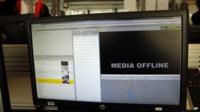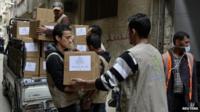
-
3 June 2015
- From the section Technology

A growing band of hacktivists is helping Islamic State spread its message by attacking media organisations and websites, a security company suggests.
Supporters of IS were helping it with opportunistic attacks and more sophisticated operations, said FireEye.
French TV station TV5 Monde was a high-profile victim early this year, but attackers have hit other media groups.
FireEye said the wide range of targets made it hard to say who was at risk.
Media message
“There’s a lot of people that go to Syria fight for IS but another way to fight is to stay home and do it from there,” said David Merkel, chief technology officer at FireEye.
“If you have an internet connection and have some skill levels you can definitely contribute.”
Mr Merkel said IS was known for using cyber-attack tools in conflict zones to gather intelligence about enemy forces.
However, he said, there was also growing evidence that people dotted around the world were working on behalf of IS to carry out cyber-attacks and spread propaganda.
Attributing these attacks directly to IS was hard, he said, but there was no doubt they were being carried out in its name.
FireEye said it had seen IS-inspired attacks on small companies and the social-media accounts of US TV stations and other news outlets around the world.
The attack that knocked French TV station TV5 Monde off air for a few hours had clearly been carried out by sympathisers rather than IS, said Mr Merkel.
The fact that official social-media communications from the militant group had taken several hours to acknowledge the attack showed it was not centrally organised, he said.

In addition, many websites have been defaced with pro-IS videos and messages by hackers who back the group’s aims.
This lack of connection between attacks and the IS hierarchy made it difficult to predict where they would strike next and what they were after, said Mr Merkel.
Rick Howard, chief technology officer at security company Palo Alto Networks, said the attacks it saw carried out on behalf of militant groups filled a broad range.
Many of the attacks were simply opportunistic and took advantage of mistakes made when sites were first set up, he said.
Others were more sophisticated and sought to grab intelligence and lurk inside networks for a long time.
“They combine elements of both criminal and state-sponsored groups,” he said.
“They want public exposure for what they are doing, but they also need legitimate skills to cause damage.”
However, he said, it was also necessary to draw a distinction between the people carrying out cyber-attacks on behalf of groups such as IS and those who carried a gun.
“There’s a difference between being a terrorist and a propagandist,” he said.
